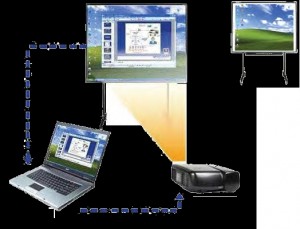Outside IT Labs, a cost-effective bundled solution – incorporating PC, projector and Interactive White Board (IWB) – appears to be the best route to increasing IWB sales.
In the 66 countries covered within the report, it is calculated, there are over 31 million classrooms: a huge market potential for companies operating within this sector. The research is showing there are no real signs of recession in education technology markets. The feedback from the marketplace is positive and the general view is that there’s a far greater safety net than other sectors. Few markets hold the promise of education, where one can see very strong sales growth for at least the next five years.
classrooms: a huge market potential for companies operating within this sector. The research is showing there are no real signs of recession in education technology markets. The feedback from the marketplace is positive and the general view is that there’s a far greater safety net than other sectors. Few markets hold the promise of education, where one can see very strong sales growth for at least the next five years.
‘Do not be put off by the adage there is no money in education. Governments will often find the money to supply thousands of boards. Take a look at Mexico, where the Enciclomedia project equipped 200,000+ classrooms with technology worth US$1.8 billion.’
A whistle-stop tour of activity in 2008 shows that the USA had a hugely successful year, with sales volumes surpassing 250,000 units, up 65% on volume and over 100% in value. In the UK, demand is still strong and will continue to be sustained. Looking to Australia, Q4 2008 proved to be its largest success to date.
India: The Next Big Thing For School Technologies
A vast country with a rapidly expanding population – 650 million additional people are forecast over the next 40 years – and having the youngest population in the World means that education is high up the Government of India agenda.
With 4.9 million classrooms the Indian market clearly provides a significant market opportunity for suppliers of IT equipment. However, the market is extremely fragmented with a vast disparity in the education system throughout the country, says BRICs: The Future of School Technologies report by Futuresource Consulting.
The research spanned across 100 schools with interviews of users and non-users of technology in private and government sectors. It also interviewed participants from resellers of technology into schools and state education departments.
There are significant differences between private and government schools, however, with private schools far more advanced in terms of teaching standards and the use of IT in general. The short-term opportunity clearly lies within the private sector. Whilst there have been some examples of IT investment in Government schools, it is very sporadic and basic infrastructure requirements are currently of a much higher priority.
However, it should be noted that at present, even within private schools, IT equipment tends to be located in an IT lab as opposed to individual classrooms, thereby limiting the potential penetration opportunities for IWBs and projectors. Outside IT Labs, a cost-effective bundled solution




















